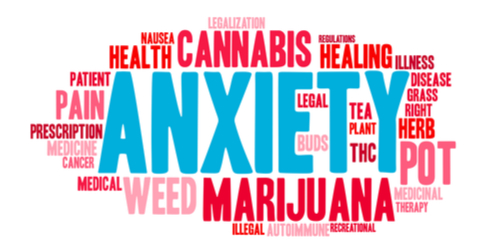How Can CBD Help Anxiety?
Posted 7 years ago by Ian Shutts

We all deal with stress and anxiety now and then. It’s a normal part of life. When the stressor is gone, we bounce right back and we learn from that experience. The stressful event taught us how to cope, so we will know how to overcome future problems.
However, it’s different for people who suffer from extreme anxiety. Instead of facing the problem head on, they tend to withdraw from people or act out, with the stressor amplifying all their negative emotions and paralyzing them from taking action to address the situation.
How they react isn’t their entire fault. Past traumatic experiences, medical problems, genetic predisposition, an imbalance in neurotransmitters, drug and alcohol abuse – all these contribute to stress and increased anxiety.
While extreme anxiety can be controlled by conventional drugs, sometimes long-term use of these drugs does more harm than good. In addition to the side effects like dry mouth, dizziness, headache, fluid retention, weight changes, gastrointestinal upset, complications from prolonged use can also lead to drug dependence, kidney damage, and heart problems. Sometimes, too, these drugs aren’t effective for some patients, which can leave them suffering from debilitating symptoms.
So what then can be a safe alternative drug for anxiety problems?
CBD and Anxiety
Numerous research studies have revealed that CBD, the nonpsychoactive cannabinoid found in cannabis, has the ability to help patients suffering from anxiety disorders. These studies have also been backed up by many anecdotal stories, with people sharing how CBD has helped them cope with their anxiety problems – from social phobia to generalized anxiety disorder and even post-traumatic stress disorder.
But how does CBD work to relieve the symptoms of anxiety?
Studies have shown that people suffering from anxiety disorders have an imbalance in their neurotransmitter levels, causing a disruption in the way the brain cells relay the stimulus. Excitatory neurotransmitters like glutamate and dopamine are high, while inhibitory neurotransmitters like GABA and serotonin are low. More excitatory neurotransmitters in the brain increase the brain cells’ excitability, activating the region of the brain responsible for the fight-or-flight response. This is one of the reasons why people with anxiety disorders easily feel agitated and stressed out during stressful events – heart palpitating, skin clammy and sweaty, respiration labored, and blood pressure high.
Now CBD has the ability to normalize these abnormal neurotransmitter levels, and it does this through a number of ways.
It normalizes dopamine and glutamate levels, the excitatory neurotransmitters. CBD activates the adenosine receptor which, when stimulated, suppresses the release of these excitatory neurotransmitters. When these levels are controlled, the brain cells become less excitable.
It increases the serotonin and GABA levels, the inhibitory neurotransmitters. CBD directly stimulates the serotonin levels to create its calming effects. When the serotonin receptors are activated, blood pressure, heart rate, and respiratory rate return to normal. As for GABA, CBD suppresses its reabsorption by the cells. GABA is the primary neurotransmitter that balances out or neutralizes the excitatory neurotransmitters.
CBD also has an effect on the body’s endogenous cannabinoid called anandamide. Anandamide binds to the CB1 receptors. These receptors play a major role in the modulation of pain and stress response to stimulus. Anandamide, when it stimulates the CB1 receptors, produces a calming and relaxing effect. Unfortunately, anandamide is quickly broken down by enzymes. Now, CBD can prevent the breakdown of anandamide by preventing its main transporter, the fatty acid-binding protein, from carrying anandamide closer to the enzyme that breaks it down, known as the fatty acid amide hydrolase.
CBD also promotes hippocampal neurogenesis (formation of new neurons). The hippocampus is the part of the brain responsible for memory formation and plays a part in the development of fear and anxiety associated with memories and experiences. Studies have shown that people who have anxiety-related problems and behaviors have impaired hippocampal neurogenesis. Now CBD, through animal studies, has been found to promote hippocampal neurogenesis. It helps the hippocampus grow healthier neurons.
Clinical Studies and Anecdotal Stories
One noteworthy clinical study involved 24 individuals who suffer from generalized anxiety disorder. Half of the group was treated with CBD prior to undergoing a simulation public speaking test, while the other half was only treated with placebo. Those who were treated with CBD reported significant improvement in their stress and anxiety levels. They were also able to perform better than those who were treated with just the placebo.
Christopher, a war veteran suffering from post-traumatic stress disorder, was on various medications to control his pain and PTSD symptoms but found that they did little to help his medical problems. It was only when he tried CBD that his pain and PTSD symptoms improved. He also felt more connected to people, and his aggressiveness, stress, anxiety, and paranoia decreased.
Anxiety problems can be very debilitating and affect all aspects of a person’s life – personal, social, or professional. While conventional drugs can help control the symptoms, some people do find that these drugs can’t effectively control their anxiety and are left dealing with their symptoms on a daily basis. CBD is a safe and nonpsychoactive, anxiolytic compound that has the potential to help patients dealing with anxiety disorders.